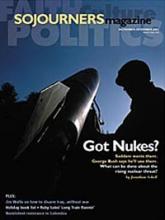Since Sept. 11, country music stations have blared songs like Lee Greenwood's "God Bless the U.S.A." and Aaron Tippin's "Where the Stars and Stripes and the Eagle Fly"—uncritical paeans to American pride. Or Toby Keith's mix of patriotism and revenge, "Courtesy of the Red, White, and Blue": "And you'll be sorry that you messed/With the U.S. of A./'Cause we'll put a boot in your ass/It's the American way."
Mixing folk and rock with country music genres, Steve Earle's Jerusalem challenges all this unbridled patriotism, especially with its hotly debated ballad about John Walker Lindh—the so-called "American Taliban" facing 20 years in prison for aiding the Taliban regime in Afghanistan. "John Walker's Blues" has earned Earle adjectives like "unpatriotic"; he is someone who "glorifies a traitor," according to Nashville radio host Steve Gill, and whose album deserves the "dustbin of history."
Although a nominee and winner of numerous country music awards, Earle has often violated canons of the Nashville music establishment. He's long opposed the death penalty and fought for welfare rights. In the space of a single song, "Christmas in Washington" on his 1997 El Corazón, he invoked the ghosts of Woody Guthrie, Emma Goldman, Malcolm X, Joe Hill, and Martin Luther King Jr., calling them to lead a new march for freedom against the government's union-busting and so-called welfare reform.
Jerusalem's controversial ballad doesn't endorse Walker Lindh's actions or beliefs. Earle simply imagines his way into the young man's life, combining elegant melody with Quranic chant, and offers musings toward deciphering the man's enigma. What perhaps rankles some is that the song portrays Walker Lindh as seeking a way out of the dim life of being "an American boy raised on MTV"—he chose to travel, experiment with Islam, and study Arabic instead of plugging in the headphones, mesmerized like some good MTV kid.
Read the Full Article
